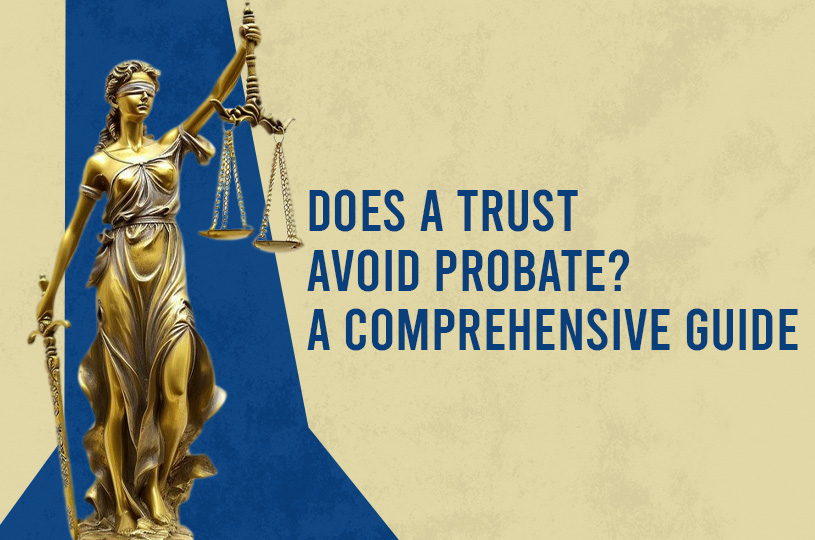When planning your estate, understanding how a trust works can significantly simplify the process for your beneficiaries. One of the most commonly asked questions is, “Does a trust avoid probate?” The answer is yes—when set up correctly, a trust can help bypass the probate process, saving time and money while reducing stress for your loved ones.
In this guide, we’ll explain how trusts work, their benefits, and how to set up a trust tailored to your needs. At English Law Firm, we specialize in estate planning, helping clients in Texas, Georgia, and Mississippi create trusts that align with their goals.
What Is Probate?
Probate is the legal process of validating a deceased person’s will, settling debts, and distributing assets to beneficiaries. While probate ensures legal oversight, it can be time-consuming, costly, and public. On average, settling an estate through probate can cost between 4% and 7% of the estate’s value.
Source: MBB Legal
For a deeper understanding of probate, check out our guide on how do you know when an estate is settled.
What Is a Trust?
A trust is a legal arrangement where a trustee manages assets on behalf of beneficiaries. The grantor, or person creating the trust, transfers ownership of assets into the trust.
Types of Trusts
- Revocable Living Trust: Can be changed or revoked by the grantor during their lifetime.
- Irrevocable Trust: This cannot be modified once established, providing enhanced asset protection.
- Property Trusts: Specifically designed to manage real estate, such as a family home or rental properties.
To learn more about managing property through a will, read our article on how to will a house.
Does a Trust Avoid Probate?
The primary benefit of a trust is its ability to avoid probate. When assets are placed in a trust, they are no longer considered part of the grantor’s estate, allowing them to bypass the probate process entirely.
Source: Finance Strategists
How Does a Trust Work for a House?
If you place a house in a trust, the trustee ensures it is transferred directly to the beneficiary upon your death without going through probate. This can save months or even years of legal proceedings.
For more details, explore how to start probate.
Benefits of Using a Trust to Avoid Probate
- Time Efficiency: Probate can take months or years to complete, while trusts allow for immediate asset transfer.
- Cost Savings: Avoiding probate reduces court fees and attorney costs.
- Privacy: Unlike probate, which is a public process, trusts keep your estate matters private.
- Flexibility: Trusts can be tailored to specific needs, such as caring for minor children or protecting family businesses.
Learn more about simplifying probate processes in our blog on how to close an estate.
How to Set Up a Trust to Avoid Probate
Setting up a trust requires careful planning and attention to detail. Here’s a step-by-step guide:
Step 1: Choose the Right Type of Trust
Consider your estate planning goals. For example:
- Irrevocable Trusts: Ideal for asset protection and tax benefits.
- Revocable Living Trusts: Flexible and easily adjustable during your lifetime.
Step 2: Draft a Trust Agreement
Work with an experienced estate planning attorney to create a legally binding trust document.
Step 3: Transfer Assets into the Trust
Ensure all assets, including real estate and financial accounts, are retitled in the name of the trust.
Step 4: Designate a Trustee
Appoint a reliable trustee to manage the trust and distribute assets according to your wishes.
For help setting up a trust for real estate, consult our guide on putting real estate into a trust.
Trusts and Real Estate
Placing real estate in a trust is one of the most effective ways to avoid probate for your property. Here’s how:
Benefits of a Property Trust
- Streamlined Inheritance: Beneficiaries receive the property without legal delays.
- Tax Advantages: Certain trusts can reduce estate and inheritance taxes.
- Protection from Creditors: Assets in an irrevocable trust are shielded from creditors.
How to Create a Trust for a House
- Identify the type of trust that suits your needs (e.g., irrevocable or revocable).
- Work with an attorney to draft the trust agreement.
- Retitle the property in the name of the trust.
For more information, check out how to file a petition for probate.
FAQs About Trusts and Probate
1. Do Trusts Avoid Probate?
Yes, assets in a properly funded trust bypass the probate process entirely.
2. Does a Living Trust Avoid Probate?
Yes, a living trust ensures assets are transferred directly to beneficiaries without probate.
3. What Is the Best Trust to Put Your House In?
This depends on your goals. For maximum flexibility, consider a revocable living trust. For tax benefits and asset protection, opt for an irrevocable trust.
4. Do I Need a Trust to Avoid Probate?
While a trust is the most effective way to avoid probate, other methods, such as transfer-on-death deeds, may also work for certain assets.
5. Can I Include Rental Properties in a Trust?
Yes, trusts can manage rental properties, ensuring income is distributed to beneficiaries.

